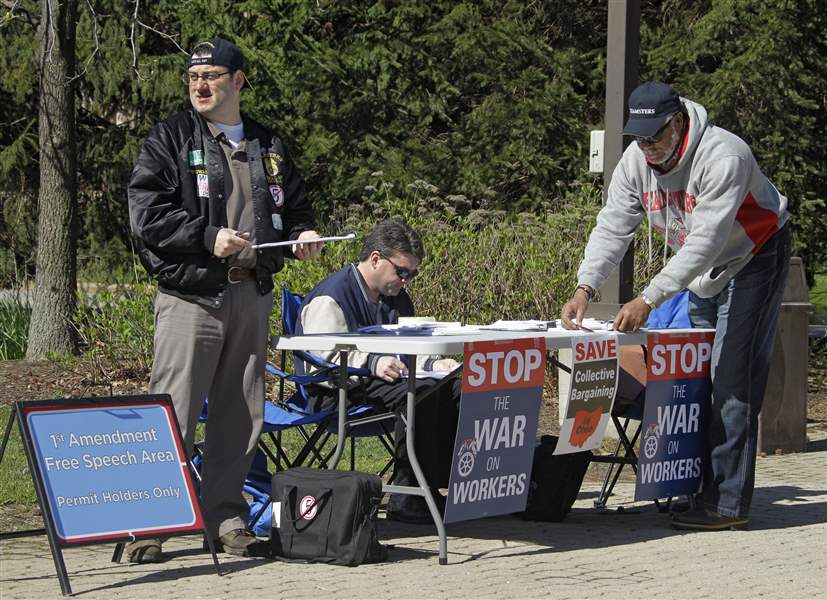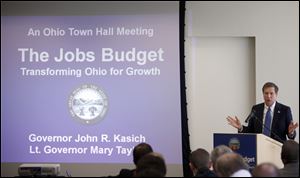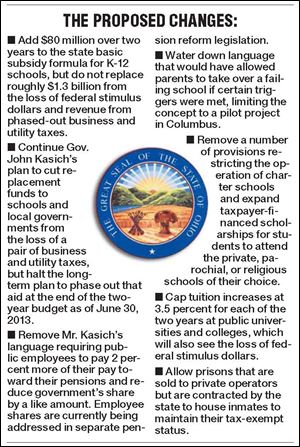
Ohio House passes budget, more tax cuts
Party-line vote slashes aid for schools, state programs
5/6/2011
Associated pressTeamsters Matt Ford, left, Eric McKee, and Charles Smith collect signatures on petitions to repeal Ohio's collective bargaining law. The union members were outside Cleveland Metroparks Zoo Thursday.
ASSOCIATED PRESS

Ohio Gov. John Kasich's proposed budget was $70 million lighter than the one passed by the House.
COLUMBUS -- The Republican-controlled House Thursday handed Gov. John Kasich most of what he wanted as it voted along party lines to approve a proposed budget.
The plan promises more tax cuts while reducing aid to local governments, schools, libraries, and a swath of state programs.
The $55.6 billion two-year plan, $70 million larger than Mr. Kasich's proposal, provides $80 million more for schools than the governor suggested, dangles $100 million in incentives before cash-starved local governments to share public services, and strikes the governor's proposal to shift more of the burden for paying for public employee pensions to workers.
The 4,004-page bill would not interfere with the final 4.2 percent increment of a total 21 percent income tax cut that took effect on Jan. 1 after a two-year delay.
The Republican-controlled House went a step further by adding the elimination of Ohio's estate tax beginning in 2013. That move would have little impact on this two-year budget.
Eighty percent of the taxes collected on estates worth at least $338,333 goes to local governments.
"Ohio's estate tax increases incentives for people and businesses to leave Ohio and never come back,'' said Rep. Ron Amstutz (R., Wooster), chairman of the House Finance and Appropriations Committee. "I look at it personally as an immoral tax. It is theft. … It's time for us to say good-bye to that tax."

He said he didn't expect any Democratic votes.
"This is a budget made for voting 'no'," he said. "Only those who feel a responsibility to lead this state to move forward will vote for this budget."
While the House debated, several hundred people protested outside the Statehouse, arguing that the budget is an attack on the middle-class by the Kasich administration to pay for tax breaks for the rich and corporations.
The budget would wipe out a projected $7.7 billion revenue shortfall. That deficit is caused largely by the current budget's heavy reliance on one-time federal stimulus funds to balance the books.
It would sell six adult prisons, sell off the profit stream of its wholesale liquor operation to the state's new, nonprofit economic development corporation, refinance debt, and count on stronger revenue growth.
Debate shifts to the Senate. A final plan must reach Mr. Kasich's desk by July 1. April tax collections were stronger than projected, and Republicans expressed hope that more money may yet be put into nursing homes, schools, or local governments.
Democrats, however, countered that those more optimistic numbers are because of a recovering economy that would be endangered as schools, cities, counties, and nursing homes slash employment to compensate for state budget cuts.
"Your priorities are ripe with hypocrisy," Rep. Vernon Sykes (D., Akron) said. "The first is the idea of smaller government. You're increasing the general revenue fund by $5 billion over the biennium."
Republicans argue that the bulk of the additional spending is the result of state taxpayers having to pick up the tab for Medicaid and other spending that had been financed by federal stimulus money.
Rep. Lynn Wachtmann (R., Napoleon) accused former Democratic Gov. Ted Strickland of creating problems the state is now trying to correct.
"They built this house of cards on one-time Obama money, $8 billion worth, that they knew would collapse," he said. "Pretty much everyone in this state is being asked to live with less money. What's the alternative? You're afraid to admit you want to raise taxes."
Democrats tried without success to strip provisions of the budget that touch on issues already included in Senate Bill 5, the controversial law passed earlier this year that restricts the collective-bargaining rights of public employees.
The bulk of those provisions fine-tune language pertaining to evaluating the performance of public school teachers when determining their pay.

Associated pressTeamsters Matt Ford, left, Eric McKee, and Charles Smith collect signatures on petitions to repeal Ohio's collective bargaining law. The union members were outside Cleveland Metroparks Zoo Thursday.
"Those kinds of judgments are hard to measure and caused teachers to organize about 100 years ago … because they became very subjective," said Rep. Teresa Fedor (D., Toledo), a former teacher.
"We do not have any research in America where anybody who has tried to do this kind of evaluation has made any difference in the classroom."
The proposed budget also holds the voter-approved casinos in Toledo, Cleveland, Columbus, and Cincinnati to a strict interpretation of "gross receipts" when it comes to the Commercial Activity Tax.
Casino operators have threatened to sue, arguing that the tax should be applied to casino revenue after it pays out prizes, not on all wagers, as the state contends.
Republicans raised the threshold at which the prevailing wage, typically regional union-scale wages, kicks in for many publicly funded projects.
The threshold was set at $3.5 million, up from $78,258 for new construction and $23,447 for reconstruction. Mr. Kasich had proposed drawing the line at $5 million.
"Of the 34 states that have prevailing-wage regulations, four have thresholds in excess of $100,000. Four," said Rep. Matt Szollosi (D., Oregon). "This represents an increase of 3,500 percent. This increase is outrageous and totally out of line."
Republicans rejected an attempt by Rep. Michael Ashford (D., Toledo) to remove language to open a two-year window for local governments in Wood and Lucas counties to ask voters whether they want to withdraw from participation in the Toledo Area Regional Transit Authority.
The language, added at the request of Reps. Randy Gardner (R., Bowling Green) and Barbara Sears (R., Monclova), was sought by Perrysburg.
Mr. Ashford argued that the language would disproportionately affect working and middle-class neighborhoods if one or more suburbs are permitted to unilaterally withdraw from the public transit system.
Contact Jim Provance at: jprovance@theblade.com, or 614-221-0496.